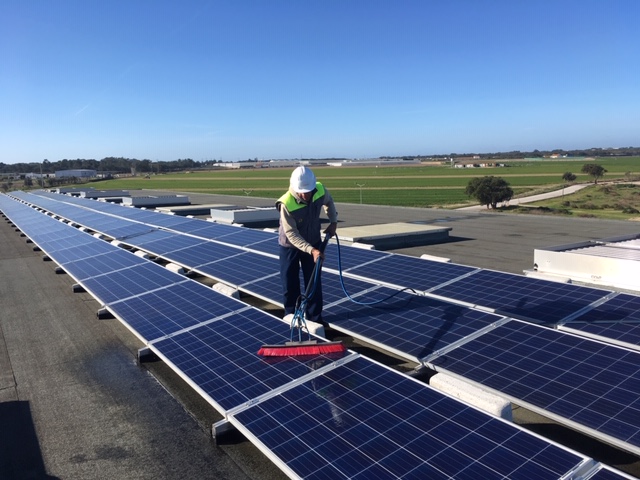
Solar module washing: Solar modules are not like windows
We wash our cars, the windows or the floor to keep them clean and preserve them over time. What about the solar modules? They also need to be cleaned regularly. But how do you clean a solar plant and what care should you take? Find out more in this blog article.
Solar modules need to be washed, especially in spring. Unfortunately, due to ignorance, many solar plant owners deal with the dirt on their solar modules in a rather random way: with water, a mop and a brush. But a solar module is not a window!
The modules are covered by a separate glass. It is often covered with an invisible and extremely thin anti-reflective coating. By cleaning or brushing the dust, you risk ruining the glass and the anti-reflective coating of the solar module and even voiding the manufacturer’s warranty.
Tap water is unsuitable for washing the modules because it leaves lime stains on the glass. This can cause solar production to fail. For this reason, a professional always uses demineralized water and a special brush.
Check the type and amount of dirt that accumulates on your solar modules
In places with a high concentration of dust, such as near industrial areas or roads with heavy traffic, the washing of solar modules should be done more frequently. Dust and dirt accumulate mainly along the frame of the modules – on roofs with a slope at the lower end.
Regular washing protects against hot spots
The dirt dries and heats up with solar radiation on the dark surface of the module. In this way, the dirt can even cause unwanted hot spots: the shadow of the stain on the solar module affects the covered solar cells that stop producing electricity, increasing their internal resistance. However, as the other cells are connected in series and these continue to produce solar energy, their current is forced through the shaded cell. Due to the high internal resistance and the current flowing through it, a loss of energy occurs which results in the photovoltaic module overheating. In the worst case scenario, the hot spot effect can ignite the solar module, a particularly dangerous situation if there is flammable material nearby, such as branching and trees.
Ammonia is a threat to the good conservation of your solar module
Many solar systems are installed in farm buildings. But especially farm animals release a lot of ammonia, this combines with the dust from the air fixing itself on the solar modules in the form of a thick, solid film. This attracts a lot of dust. Only washing with water will have a reduced effect on the removal of dirt.
Ammonia from animal stables in the gaseous state is very aggressive and can lead to corrosion of the solar modules.
Make a plan of washing the solar modules with a specialist
Depending on the nature and degree of dirt, you should draw up a regular cleaning plan. Leave the cleaning of your solar modules to a specialized technician. He ensures that your modules are washed regularly with the appropriate equipment – keeping the warranty valid. Professional washing is a basic and essential measure to ensure the best installation performance over the years.
SOLVasto offers solar module washing services. Contact us for more information and a quote.




